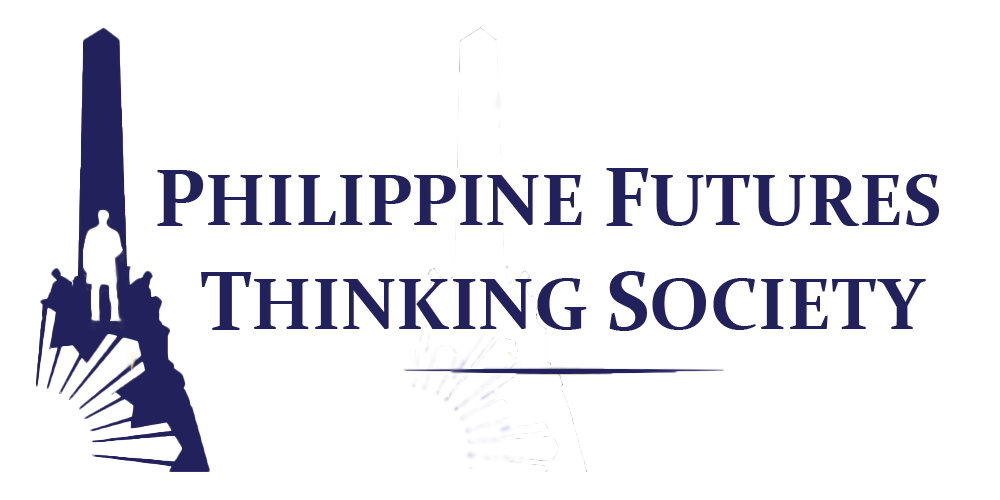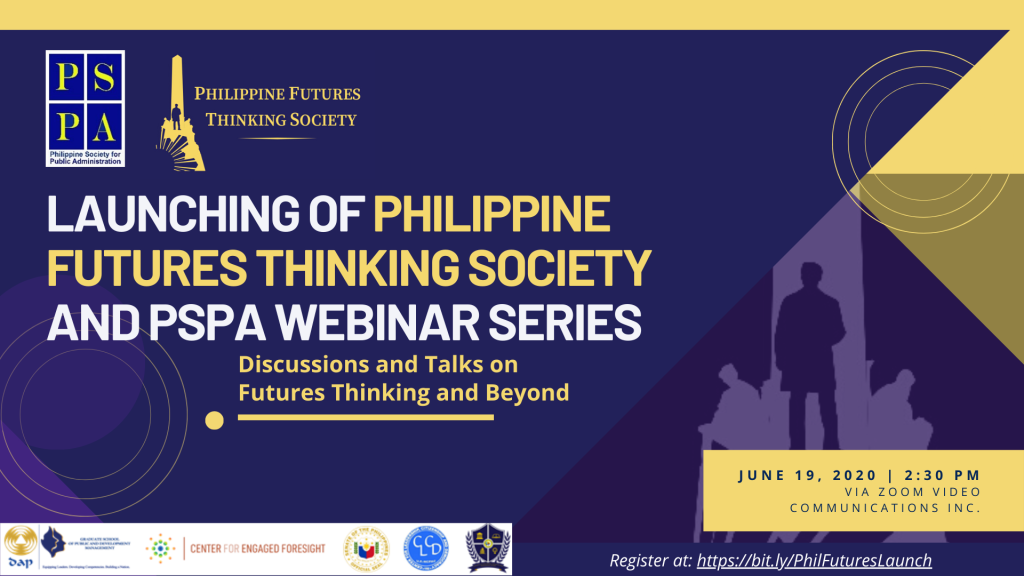
The Office of Senator Pia Cayetano, Chairperson of the Committee on Sustainable Development Goals, Innovation, and Futures Thinking (SDGIFT) organized FutureSpeak, the first futures thinking webinar for members of the House of Representatives. It was conducted on July 17, 2020 from 1:30 to 4:30 pm. Dr. Sohail Inayatullah, UNESCO Chair for Futures Studies, Saku Koskinen, Future Platforms, and DAP-GSPDM faculty members Dr. Lizan Perante-Calina, Senior Vice President and Dean, Prof. Shermon Cruz and Dr. Reginald Ugaddan were resource speakers.
Dr. Sohail Inayatullah introduced futures thinking and shared cases and insights on how foresight can be applied to policy-making. Dr. Inayatullah accentuated the power of narrative foresight, the worldviews, myth, and metaphors that we tell ourselves, to transform mindsets and strategies today. He discussed the different stages of futures, which involves the process of how an envisioned future can be achieved by resolving social injustice, risk mitigation, opportunity creation, and providing the direction to where they are headed.
Mr. Saku Koskinen of Future Platforms, a Finnish futures tech company presented the Foresight Radar, an Artificial Intelligence (AI) powered foresight radar software. The Foresight Radar aids researchers, analysts, and decision-makers search for weak signals, analyze the impact and implications of trends and anticipate phenomena and future scenarios. It is a comprehensive visual tool that helps policy analysts crunch information and data. The radar updates as necessary and forecast changes in real-time.

Sen. Pia Cayetano organized and moderated the webinar.
Dr. Lizan Perante-Calina, the Dean and Senior Vice President of DAP-GSPDM and PhilFutures President discussed the importance of futures thinking. She emphasized the link of futures thinking to leadership, communication, and accountability. By employing the whole of nation approach in government reform, foresight allows key leaders and institutions to focus on long term goals. Futures thinking can deepen the process, application, and generation of innovative responses to policy problems, and the emergence of new ideas and policies. And through futures tools and methods, it fast tracks the application of evidence-based policy-making, said Dr. Perante-Calina. She said, “we could better identify and resolve people’s needs, know what society should and can do, and what current and future technologies are capable of through futures thinking.”.
For his presentation, Prof. Shermon Cruz, DAP-GSPDM faculty accentuated the imperativeness of futures literacy to empower the human agency to imagine and create alternative and preferable futures. He emphasized the need to build capacities of people and institutions to use the future to transform, shift mindsets and change today. He began with a quick workshop by asking participants to ask a question if they were to wake up in a brave new world ala Rip Van Winkle. “Questioning the future and questioning assumptions of the future is an essential first step to transforming the future today,” Prof. Cruz said during the workshop. He presented case studies on how the United Nations Framework for Climate Change Global Adaptation Team employed foresight methodologies to reframe climate change futures and envision probable and desirable future worlds.

Rep. Geraldine Roman shares her thoughts on the importance of futures thinking.
This workshop yielded a number of innovative ideas on climate change adaptation and pathways to resilience. He also demonstrated how a local government unit in West Java Province trained and applied futures tools and methods to anticipate and create alternative and preferable 2040 tourism and resilience futures. He mentioned that West Java’s foresight process, which mirrors the stages of futures that Dr. Sohail has mentioned, can be used as a model to create a foresight driven policy-making and planning process.
The fifth speaker, DAP-GSPDM’s faculty Dr. Reginald Ugaddan, talked about the Future of Cities and Municipalities. Dr. Ugaddan shared ongoing research he has with partners and scholars from South Korea. The purpose of the study identified indicators of future-prepared cities, and explored the characteristics and contexts of future cities by reviewing and analyzing literature, current situations, practices, and demands. According to Dr. Ugaddan, urbanization is spreading and increasing at an alarming rate not just here in the Philippines but in other countries as well. Propelled by the fourth industrial revolution, the demand for further industrialization is growing. Dr. Ugaddan also mentioned that the current design of our cities have no future perspective. He said that “it is imperative that we plan for future cities that are resilient to climate change including the emerging challenges that may come our way.”

The webinar was moderated by Sen. Pia Cayetano and attended by around 50 members of the House of Representatives. PhilFutures is grateful to Mr. Noel de Guia, Senate consultant for organizing the event.
by Luigi Andrada, Amaia Janelle Baculo, and Eva Barnes

